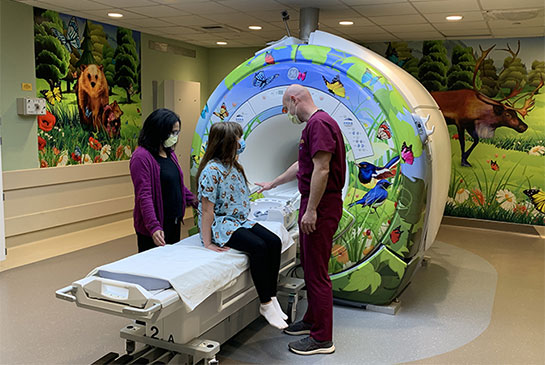Developmental and Behavioral Pediatrics Research
-
Veronica Ahumada-Newhart, M.A., Ph.D.
Link to Veronica Ahumada-Newhart bioarrow_forwardVeronica Ahumada’s research is focused broadly on the role of interactive technologies in human development and behavior in individuals with medical conditions or disabilities. Veronica Ahumada’s current research is focused on the use of tele-operated and social robots for social connectedness, inclusion, and safety. She serves as principal investigator of a $1 million dollar National Science Foundation (NSF) National Robotics Initiative grant, to create better telerobots for children who are restricted to their homes due to medical conditions or disabilities. Ahumada is also co-PI on a $1.2 million dollar University of California, Multicampus Research Projects and Initiatives grant to create telemanipulation robots for healthcare worker safety and social inclusion of individuals with medical conditions.
Research Laboratories:
Publications:
-
Roger Scott Akins, D.O.
Link to Scott Akins bioarrow_forwardScott Akins' research has focused on telehealth supports to families of children with Autism Spectrum Disorders in remote communities, partnerships between pediatric specialty providers, schools and medical home providers and utilization of complementary and alternative medicine in families of children with Autism Spectrum Disorders.
Publications:
-
Kathleen Angkustsiri, M.D., M.A.S.
Link to Kathleen Angkustsiri bioarrow_forwardKathleen Angkustsiri’s research includes the behavioral and psychophysiological investigation of anxiety and social impairments in children with chromosome 22q11.2 deletion syndrome, including the influence of environmental fit and parenting. She is also involved in clinical trials in individuals with autism and fragile X syndrome. Other interests include the role of the immune system and microbiome in autism spectrum disorders.
Publications:
-
Janice Enriquez, Ph.D.
Link to Janice Enriquez bioarrow_forwardJanice Enriquez is committed to the diversity and clinical training efforts and at the MIND Institute she currently serves as the Leadership Education in Neurodevelopmental and other related Disabilities (LEND) Associate Director, the Maternal Child Health Careers Research Initiative for Student Enhancement-Undergraduate Program (MCHC/ RISE-UP) Co-Director, and the University Center for Excellence in Developmental Disabilities (UCEDD) Associate Director of Community Engagement and Training. She also serves as the Chair for the Diversity, Equity and Inclusion Committee (DEI) at the MIND Institute. She is committed to serving all children and their families in an effort to achieve health equity and supports clinical training for the next generation of providers.
-
Randi Jenssen Hagerman, M.D., F.A.A.P.
Link to Randi Hagerman bioarrow_forwardRandi Hagerman’s research includes molecular and clinical studies in individuals with the full mutation of fragile X and those with the premutation. Studies also focus on the correlation of molecular parameters including the FMRP level and cognitive and physical features associated with fragile X syndrome. She also investigates the molecular, clinical, and pathological basis of fragile X-associated tremor/ataxia syndrome (FXTAS). In addition, she studies the association between fragile X and autism and she has carried out many targeted treatment trials for those with fragile X syndrome, ASD as well as FXTAS.
Publications:
-
Robin L. Hansen, M.D.
Link to Robin Hansen bioarrow_forwardRobin Hansen’s research involves investigation of the genetic and environmental influences on the etiology and treatment of neurodevelopmental disorders, particularly autism spectrum disorders. She also studies the developmental and behavioral outcomes of infants and young children at risk because of biomedical and psychosocial factors and is involved in a state-wide demonstration project to provide comprehensive developmental screening and expanded intervention services to at-risk families. Robin Hansen is the site PI for DBPNet, a national research network of 14 sites prioritizing clinical research in developmental behavioral pediatrics.
Publications:
-
Van Ma, M.D.
Link to Van Ma bioarrow_forwardVan Ma’s research focuses on rare neurodevelopmental conditions. She has a special interest in KBG syndrome.
Publications:
-
Gayatri Mahajan, M.B.B.S., M.D.
Link to Gayatri Mahajan bioarrow_forwardGayatri Mahajan's clinical and research interest is in health transition from pediatric to adult medicine for youth with neurodevelopmental disabilities, as well as education and outreach to adult primary care and specialty providers. She is especially interested in transition readiness and outcomes of transition, as well as adult provider knowledge and perspectives.
-

Bibiana Restrepo, M.D.
Bibiana Restrepo’s research effort has focused on the presentation, management and outcomes of children with neurodevelopmental disabilities. She has also been involved on the investigation of environmental and social vulnerabilities influencing childhood health and wellbeing. She also studies new tools and strategies to facilitate developmental and behavioral care for children living in underserved and rural areas with the goal of improving early identification and management of children with neurodevelopmental disabilities and timely identification of co-occurring medical and mental health conditions. Bibiana Restrepo’s work has particularly focused on strengthening the collaboration between community practitioners. She is also involved in telemedicine and teleconferencing programs with the purpose of improving care for children in remote locations, while promoting global collaborative efforts. Bibiana Restrepo has also been involved in clinical trials.
Publications:
-
Rosa Denisse Rodriguez, M.D.
Link to Rosa Rodriguez bioarrow_forwardRosa Rodriguez is a Developmental and Behavioral pediatrician offering care for children with various neurodevelopmental disorders. She has special clinical interest in underserved population, developmental delays and early childhood.
-
Andrea Schneider, Ph.D.
Link to Andrea Schneider bioarrow_forwardAndrea Schneider's research focuses on psychophysiological measures using electroencephalophy (EEG) and event-related potentials (ERP), heartrate variability (HRV), prepulse inhibition (PPI), and computer-based assessments that can detect changes in brain processing in individuals with neurodevelopmental and neurodegnerative disorders.
Andrea Schneider is an active Faculty member at the LEND Program (Leadership and Education in Neurodevelopmental Disabilities) at the MIND Institute and provides psychoeducational workshops.
Publications:
-
Carrie Esther Silver, Ph.D.
Link to Carrie Silver bioarrow_forwardCarrie Silver is a licensed clinical psychologist at the UC Davis MIND Institute. Her interests include diagnostic assessment of neurodevelopmental and mental health concerns in children. She also has specialized training in providing evidenced based therapy with at risk youth including those with a history of trauma.
-
Anisha P. Srinivasan, M.D., M.S.
Link to Anisha Srinivasan bioarrow_forwardAnisha Srinivasan's research focuses on equitable access to developmental-behavioral pediatrics care through collaborative partnerships with primary care clinics and community agencies. She has a special interest in community-based participatory research.
Publications:
-
Tanaporn Jasmine Wilaisakditipakorn, M.D.
Link to Tanaporn Wilaisakditpadorn bioarrow_forwardTanaporn Wilaisakditipakorn’s research focuses on healthcare access in refugee populations, developmental and behavioral concerns in refugee children, and electronic media use and sleep in children with autism spectrum disorder.
Publications:












